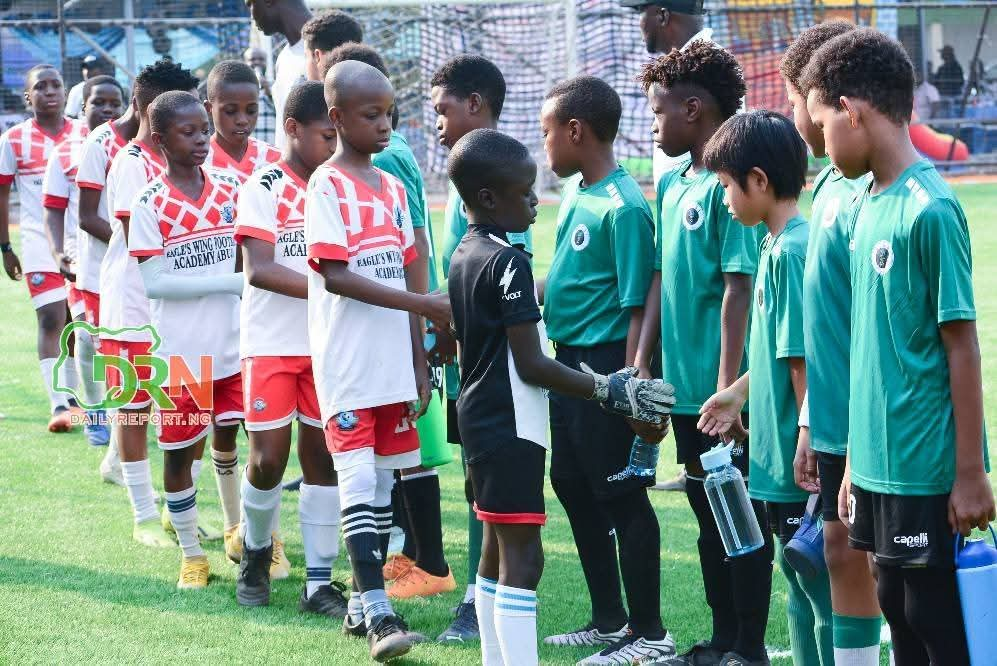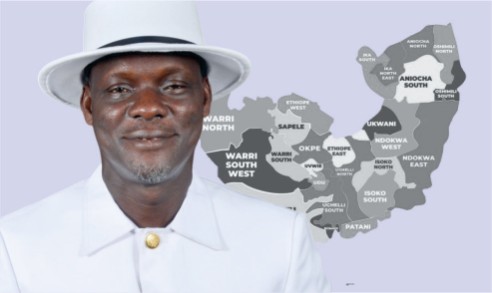[EXCLUSIVE] TANTITA IS WORKING: A Field Worker's Account of the Giant Strides of the Security Outfit's War Against Oil Theft
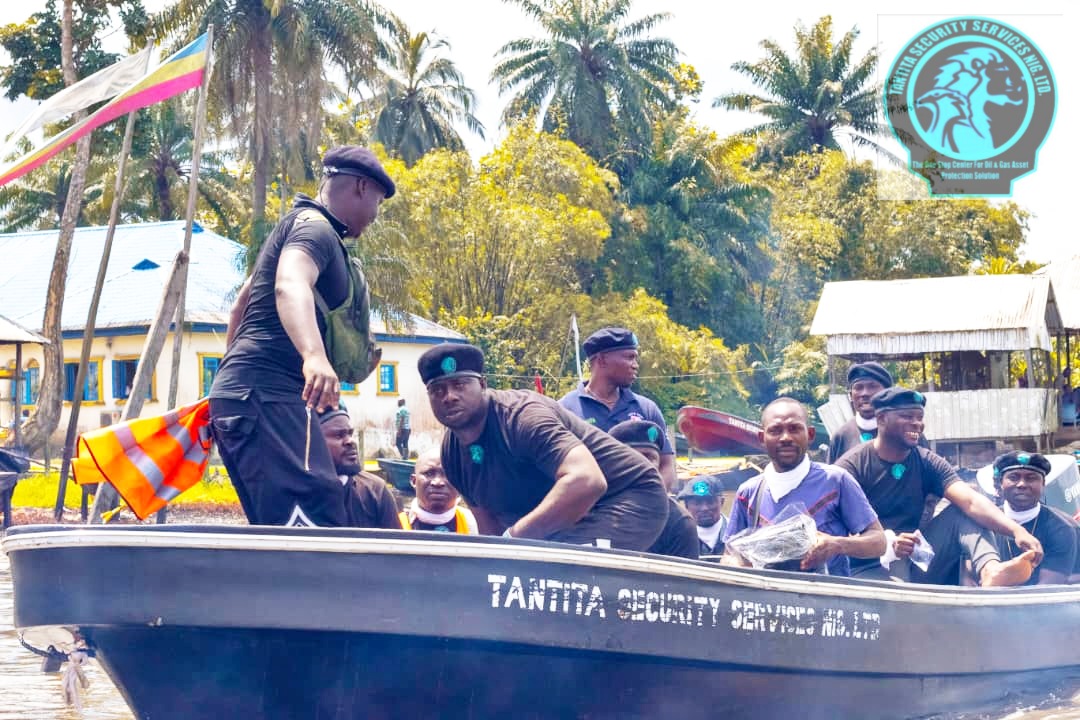
“We were in Bayelsa State for one of those missions to stop the illegal activities of bunkering after being informed of resistance by some operators. On getting to the location, I made my way around the corner of a building and as I took a turn, behold I came face-to-face with a young man armed with a gun pointing right at me in very close range. In fact, he was pressing the trigger but the gun would not come off. That was my opportunity and I took it. I rushed at him, knocking the weapon from his hand.”
The above seemed like a script from a movie scene but this was no movie, it was a real life encounter, one which is rampant in the fight to bring sanity to the Niger Delta region that has become a hot bed of pollution arising from the proliferation of local oil refining camps as well as pipeline oil theft whose operators do not consider the safety of the environment.
PENGlobal Community interfaced with an anonymous field worker engaged by the foremost security agency, Tantita Security Services Nigeria Limited, TSSNL, to gain knowledge of what working for the security outfit entails, the dangers they go through, and other challenges faced on the job.
⚫ Meet our anonymous contact
Perezuwei (not real name), whose account in the opening paragraph above is just one out of the many dangerous tales, is a youth of the Ijaw extraction in Niger Delta region, who, before his engagement as a field worker in Tantita, used to eke out a living by doing menial jobs. His highest qualification is the school leaving certificate. The high cost of acquiring education coupled with his coming from a family of low means forced him to opt for menial jobs to survive, with the hope to save money for his tuition. Presently married with increasing responsibilities at the moment, the prospect of furthering his education in fulfillment of his dream to study Political Science seems in doubt.
“It is almost going five to six months,” said the 27-year-old Perezuwei on how long he has been recruited and working for the security agency. “Before Tantita it has been from one unsteady job to another. I also decided to join activism as a member of the Ijaw Youth Council (IYC) Worldwide with the hope to gain more exposure and to benefit from youth empowerment opportunities,” he hinted.
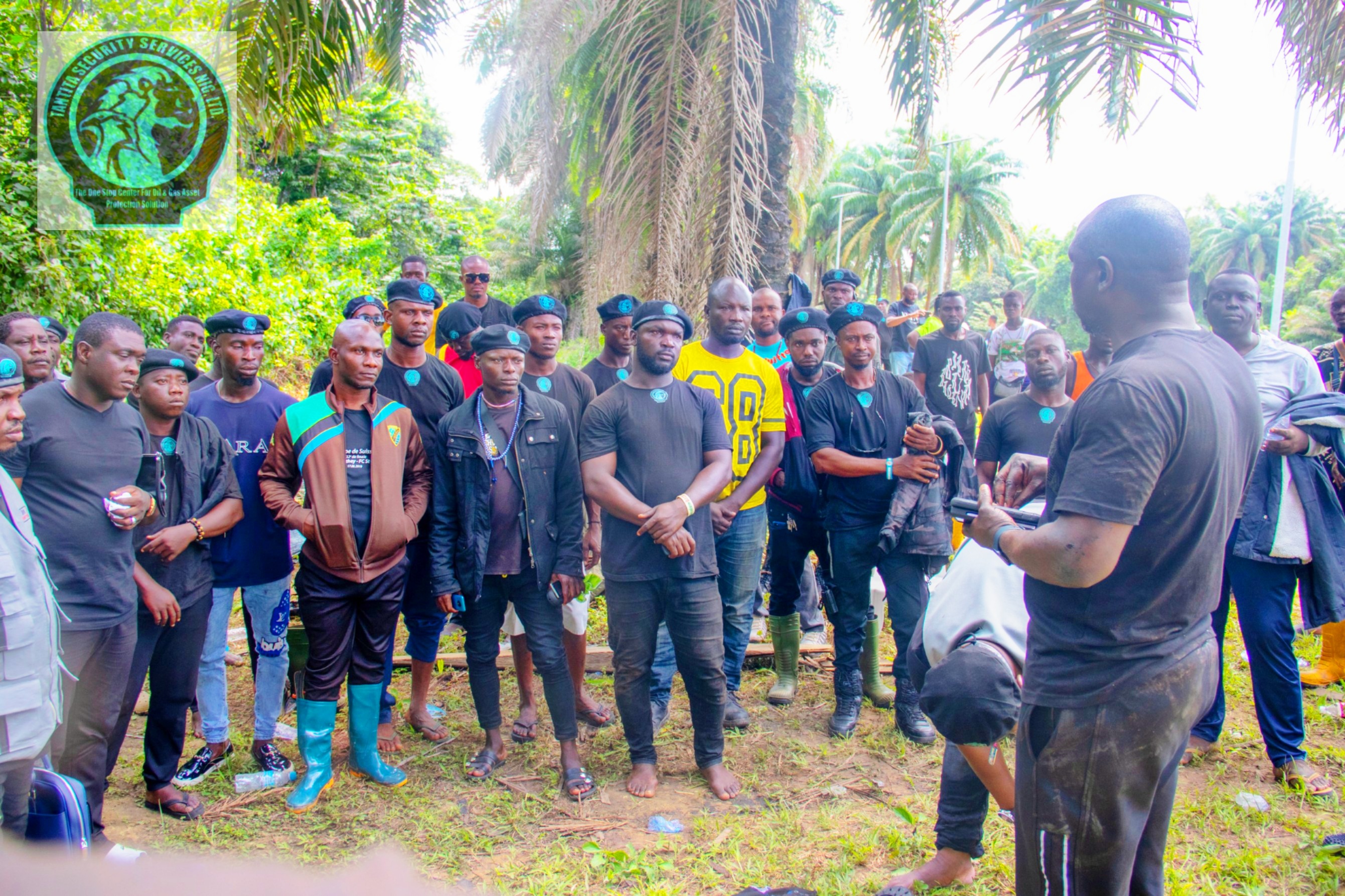
⚫ His first mission for Tantita
Perezuwei has never been a stranger to peaceful and violent protest in the Niger Delta creek communities. He has witnessed over the years issues of unemployment and oil pollution with oil companies. However, his first field experience that involves traveling through the creeks to illegal bunkering sites and identifying vandalised pipes within Delta and Bayelsa states was a different one entirely, an experience he describes as “hell” but one he gradually got used to.
“The very first time I went for field work it wasn’t an easy task because it's more like when you’re going to forcefully take from someone and you don’t really know how prepared that person is. It was more like fighting ourselves because those we are targeting are like: ‘You guys can’t stop our hustle’, and we're telling them we're going to stop their operations because we have orders from above.
“During my very first field assignment, it got to an extent whereby we were almost exchanging blows with illegal operators, it was all violent. But it's just to let them know that Tantita is on ground and no matter how anyone feels that he/she is powerful, Tantita is going to bring that person down. It was a horrible experience. That first experience is something I can describe as hell,” he added.
⚫ From Delta to Bayelsa
Though stationed in Delta state, Perezuwei said their teams occasionally go all the way, through the creeks, to Bayelsa state to forcefully stop illegal operators. According to his account, one reason for undertaking such mission to a neighbouring state is to bring total enforcement as some of the natives are very adamant, resisting attempts by teams stationed there in the State.
“I was among teams that went to Bayelsa, Peretoru and Ozobo to be precise,” Perezuwei continued as he recounts his experience. “Bayelsa State have their operational unit but we are going there under the canopy that we are coming from the headquarters direct, which is much scary than those faces they (illegal operators) see around them every blessed day that are employed there. They hardly give respect or obey their orders and all of that.
“So, whenever security from headquarters (referring to their base in Gbaramatu Kingdom) is going there, that threat is always there, that the officials coming are not familiar with them. Without this force from headquarters, those people can easily do whatever pleases them,” he revealed.
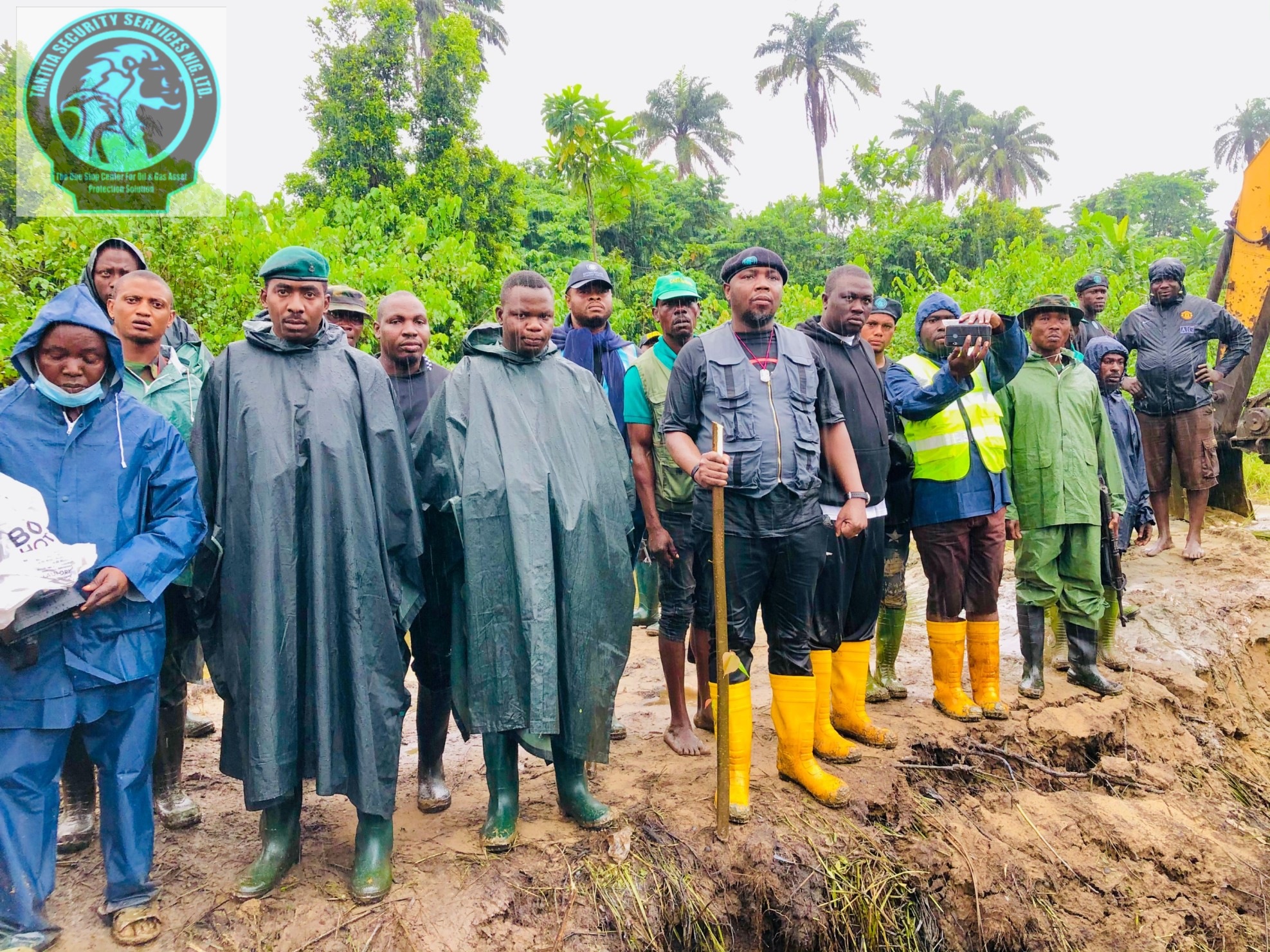
⚫ Working for Tantita
The successes recorded by Tantita since the contract of securing oil pipeline was awarded to it is a collective one with different parties contributing their roles. And these field workers, who can best be described as scouts, have no doubt played a key role. Despite not trained professionally from on the onset, overtime, field workers like Perezuwei, who in the majority are youths, have showed the will-power, determination, and capacity to succeed despite the odds they face on the job.
“Working for Tantita doesn’t really require a criteria so long as you’re a capable hand or if you’re deemed fit,” Perezuwei responded to our question of what the needed requirements are for working with the security outfit.
“Tantita is a security job whereby it cuts across the Niger Delta as a whole and if you’re opportune to be one of the field workers, automatically, it's because they deem it fit that you’re perfect for the job that’s why you’re there. To a large extent it has helped to bring about the engagement of unemployed youths,” he noted.
“Of late, training is on ground due to some security purposes on how to defend oneself on most occasions. But when the job really came on board at its inception there was no time for training. Training is ongoing now, but during the first period of two to three months, there was no training. It was just strictly go the field and do your job.”
⚫ The nature of the job
“The job is strictly trying to stop oil theft, monitor pipelines to prevent vandals; stop those individuals that are doing the illegal bunkering, precisely we call it ‘kpo fire’. Also, those people that use local boat to transport refined crude, try to weld iron drum just to make sure they turn black oil to diesoline, fuel, kerosene, just to make their day to day activity profitable for them,” Perezuwei explained on the normal job routine.
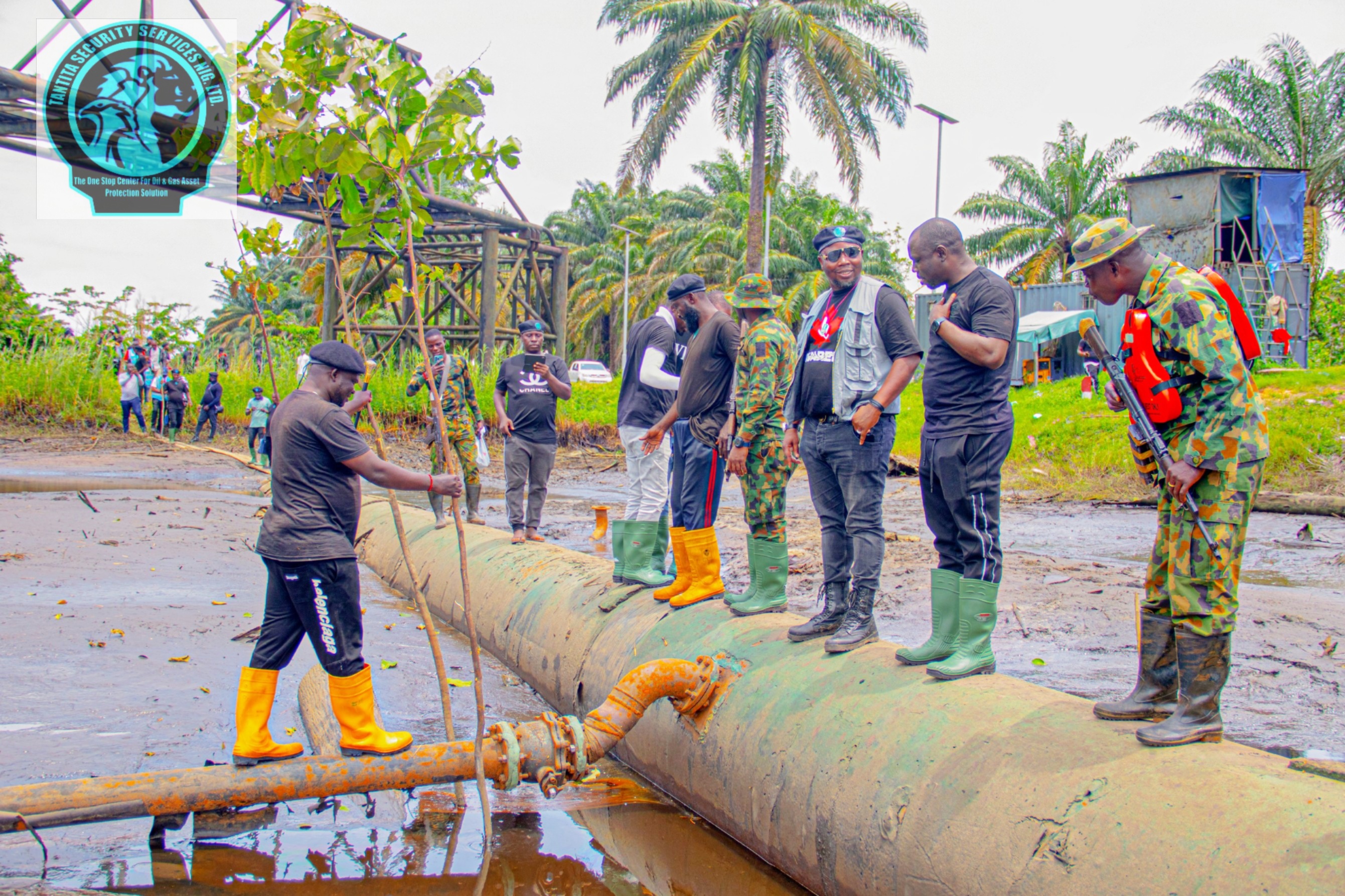
Continuing, he added, "Depending on the information received and instructions given, we venture deep into the creeks and go into some jungles to discover pipelines that have been tampered with, stuffs like that."
⚫ Threat to life and the African defense system
It is common knowledge that working for Tantita comes with a lot of challenges, the height of which is the threat to life. As seen from the account in the opening paragraph, field workers are often exposed to violent aggression from illegal operators who are hell-bent on fostering their illegal activities. On most cases some of these illegal oil operators are well-armed.
"The field work is quite challenging, the distance and kilometers we go just to bring illegal operators down is one of the stress in this job," Perezuwei confessed.
And whether he is not afraid for his life during field work operations, he said: "When it comes to the issue of armed threats, the Nigerian Army and the Nigerian Civil Defense are always with us.”
But since field workers of the security outfit are not allowed to bear arms, how do they cope with an armed situation?
“In our own department, we have the traditional way in which we protect ourselves,” said Perezuwei in response to the above question. “Let’s say it’s God first, but when it comes to our traditional way, there are certain protection; it’s not something we will go out there to kill our own fellow human beings, it’s our own self-defense because we are not eligible to carry arms.
“So, when it comes to those security angle, while some illegal operators are well equipped, in our own department we believe in our own attires we go with as self-protection, and they're scared of us. They also know that we cannot just go to their bases ordinarily; they believe there are things in our bodies that are protecting us.
“When it comes to armed security we don’t really have a defensive force at our own end but we believe on the traditional things that are being given to us to protect ourselves. Moreover, the Nigerian security agencies are with us 24/7. Whenever we are out there, they are with us in every activity we engage in,” he re-echoed, giving off the perception of extra confidence built in them by the presence of well trained and armed security forces working in collaboration with them.
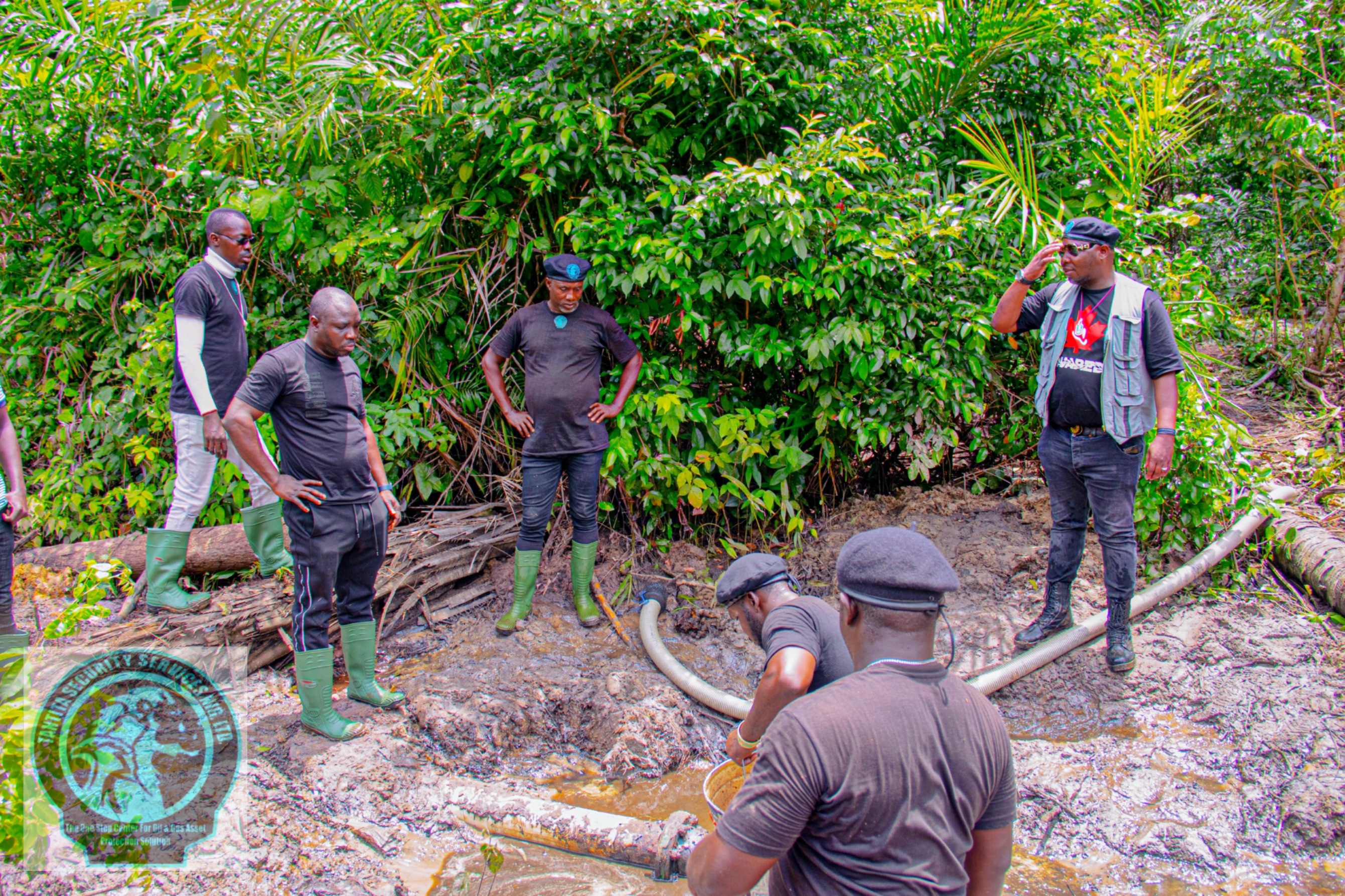
⚫ Dangerous flashpoints
“Those situations (violence) do occur frequently in the areas outside our headquarters, as those people are kind of dangerous,” he explained on the dangerous flashpoints where threat to life is highest the most.
“Those people there are letting you know that you cannot leave your territory and come to their own territories to tell them what to do. So, they come with all kinds of weapons: bottles, cutlass; their own cases are always different from ours that are within,” he hinted, a revelation that there is a large scale compliance in the Gbaramatu area than in other locations.
⚫ Rating Tantita's operations
Of course, it is general knowledge that Tantita has brought some sanity to the oil and gas industry by putting off, to a large extent, illegal oil activities including the discovery of alarming pipeline taps in the region, as well as vessels transporting stolen crude oil contents, thus attracting positive ratings from stakeholders in the industry.
"If I am able to rate Tantita’s operations for the past few months that we have been on board, I will probably say a 90 percent credit," said Perezuwei, beaming with smiles as a kind of self-reassuring relief and a pat on his own back.
"It is because almost all areas are calm; from Delta, Ondo, Bayelsa, Rivers; the situations are very calm unlike what it used to be before. You as a media you can see it for yourself because the river is now well cleaned unlike before where everywhere you go, it’s black oil. I give ourselves 90 percent credit because Tantita is really working," he confessed.
⚫ Any compensation and orientation for illegal local operators?
Most often, locals engaged in the setting up of refining camps have based their actions on the lack of jobs. And whether Perezuwei is aware of some sort of arrangement with these persons to inculcate them to be part of the pipeline surveillance project, he said:
"I really can’t say if there was any compensation on ground because the only compensation I see is the giving of job slots on securing pipelines. But the challenge for some illegal operators is that the payment for securing pipelines when compared to what they claim to be making in their outlawed trade is small. To them it's not something tangible they can rely on because those people, as they do claim, say they can easily make N2 or N3 million a night," he disclosed.
Speaking further he said, “Also I've not seen any kind of education or orientation given to them that this thing you’re doing you’re endangering your life and all of that. Partly because these operators are already aware of such. They themselves know that their activities pollute the environment but out of irresponsibility, and driven by the quest for quick money, they're ready to sacrifice anything. There's nobody that can claim ignorance of the dangers of oil pollution to our environment.”
⚫ Motivation on the job
Surely, for most people, money is a motivator on the job. And whether field workers are getting that motivation, he said: "At first, our salaries wasn't coming as at when due. Like, probably they owe us up to two, three months, then by the end of the day when they come out with the salary, it would be just one month.
"For us the field workers, why our complaint is hard is that we have families and children, and you can’t expect us to go borrow, then probably when you pay us one month and we immediately clear off our debts there is no other money left.
"But gradually things are changing positively. However we are expecting them to probably do it more like 25th, 26th, 27th, 28th of the month you’re paying your workers. It will enable us reach out to our day to day activities, our families and other things that are attached to our lives.
#penglobalreport #Tantita

